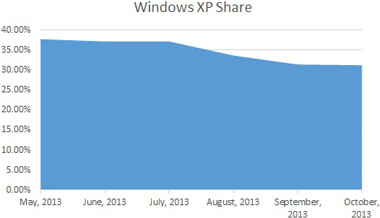The Windows XP Exodus Hits a Slowdown
It was starting to look like the world was getting serious about migrating away from Windows XP in time for the operating system's April 8, 2014 support deadline.
The end-of-life date for Windows XP has been a major focus for Microsoft, with annual reminders to partners at the Worldwide Partner Conference for each of the last three years and tools like countdown clock gadgets.
It's especially significant because users who don't migrate will be vulnerable to zero-day exploits and other security holes that Microsoft no longer ever plans to patch for XP. Their systems will be vulnerable, endangering their own data and networks, and their computers will also serve as launching pads from which attackers can mount attacks against the rest of the Web.
Hitting on that theme Oct. 29 at the RSA Conference in Amsterdam, Microsoft claimed that Windows XP systems are already six times more likely to be successfully hacked than Windows 7 or Windows 8 machines. Once support ends, attackers will wait for Microsoft's Patch Tuesday bulletins and treat them like a shopping list of new ways to attack Windows XP, according to one security expert.
Windows XP, which Microsoft sold between October 2001 and January 2009, still commanded 50 percent of PC usage share 10 years after its launch in 2011, according to NetMarketShare monthly statistics from Net Applications.
Windows 7 finally surpassed Windows XP in usage in August 2012, when both operating systems hovered around 42 percent of overall PC usage, as measured by Net Applications, which relies on thousands of partners worldwide running its software to capture platform information about systems visiting their sites.
From there, Windows XP kept its grip, losing less than a point of share per month, and in some months even gaining a little share, all the way through July of this year.
But in August and September, Windows XP shed share very quickly by Net Applications' measure. XP clunked from 37.19 percent in July down to 33.66 percent in August, then down to 31.42 percent in September.
 After dropping precipitously in August and September, Windows XP's share of the worldwide usage market stabilized in October. (Data source: NetMarketShare by Net Applications.)
After dropping precipitously in August and September, Windows XP's share of the worldwide usage market stabilized in October. (Data source: NetMarketShare by Net Applications.)
In the updated figures for all of October posted by Net Applications Nov. 1, however, the momentum stalled. Windows XP's share now stands at 31.24 percent of all desktop operating systems in use worldwide -- virtually unchanged from the month before.
With 159 days until extended support ends for Windows XP, we'll see if this is a pause or the outlines of the hard kernel of users who won't be upgrading at all.
Posted by Scott Bekker on November 01, 2013